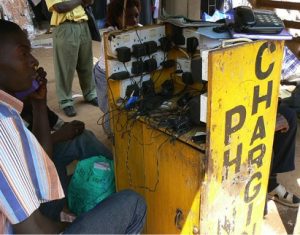By: Virginia McNally
If you think cell phones have changed daily life and relationships in the West, you are right. But worlds away in the most remote communities of sub-Saharan Africa, cell phones are making another kind of difference – they are fostering development. As a result, governments are valuing investment in mobile communications infrastructure as more than just a simple economic boost.
Government officials in Zambia, Tanzania, and Zimbabwe are setting aside millions of dollars and planning projects for rural development of communication networks, and these are not the only leaders to recognize the value of developing networks. In 2010, I.B.M. struck what many some say could be a $1.5 billion deal that secured a 10 year agreement for the supply of physical capital and services in order to update networks in 16 sub-Saharan countries. This is the largest single deal I.B.M. has made in its recent wave of investment in the continent. As it turns out, the company was lured not only by the increased use of cell phones, but also by the diverse uses of cell phones.
The general manager for growth markets at I.B.M. cited a phenomenon that Killian Fox of The Guardian described in July 2011: “African mobiles are being used to do things that the developed world is only now beginning to pick up on,” such as mobile banking. In America, it is a luxury to be able to deposit a check via Smartphone, but sending a secretary to the bank is also an option. In Africa, where about one quarter of the population uses banking services, mobile banking stands to change the way business is done at all levels.
No other region has embraced cell phone technology as fast as sub-Saharan Africa, according to Marcelo Giugale, the World Bank’s director of Economic Policy and Poverty Reduction programs for Africa. Perhaps this is because of the capacity of cell phones to function as more than communication and mobile banking devices. Farmers in Uganda receiving agriculture updates from the Grameen bank via Smartphone are positioned to profit exponentially as a result of information regarding weather and planting tips. This program is in its beginning stages, but there is potential in other areas for this type of development strategy, such as in health or education.
In fact, potential has become a reality with Peter Benjamin’s organization, Cell-Life, established in 2001 in South Africa. With HIV being the biggest killer in South Africa and the government taking an approach grounded in denial, Cell-Life began providing free text counseling for anyone with questions about HIV.
MXIt, a popular mobile messaging and social networking client, is partnering with South African school systems and cities to set up after school math tutoring resources. Students can instantly communicate with a real life tutor through the network, and receive extra attention when they might have otherwise had no access to an educational resource outside the classroom. This is a fairly small program currently, but soon will be spreading to more communities in South Africa.
While there has been much positive growth and impact as a result of mobile technology in sub-Saharan Africa, the development of networks is at a crucial crossroads. On one hand, network providers are calling for more government funded development of rural economies so that a network established in these rural areas can be “consumed” by individuals with enough purchasing power. In countries such as Zimbabwe, where underdevelopment and neglect have been used as political weapons, network providers may not see the desired development of the most remote communities.
On the other hand, Africa has had much of this technology handed to it, instead of producing it domestically. China has been a major provider of cheap technology which has made the mobile revolution possible. However, new development relationships consist not only of economic transactions, but also political statements. The West stands to miss out on a lucrative growing market by not snatching up investment opportunities. It also misses a big opportunity to forge diplomatic partnerships, and both of these potentially missed opportunities could have a negative impact on the future of market shares and diplomatic progress.
Development as a political statement does not have to be a dangerous association, as many fear it will be with China. More American companies should follow I.B.M’s example of investment and partnership, and the U.S. government should support and encourage this kind of investment. Africa, once known as the “Dark Continent” will soon be glowing with cell phone screens, ringing with dial tones and buzzing with information – all regardless of whether the West and the United States become involved.
Once the positive impacts of development are increasingly perceived by sub-Saharan governments, it will be difficult to resist development in areas that have been neglected as part of a political scheme. If the West becomes associated with development – democracy and freedom will too. While the increased popularity of the cell phone has already made a positive impact on Africa in the last decade, it could have a wider impact on the U.S. economy, the relationship of the West to Africa, and even the development of democracy in countries where China is currently the developmental lifeline.

